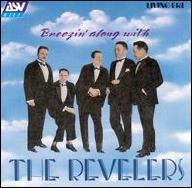In addition to their recordings and personal appearances, the Revelers were an early success on radio, appearing as regulars on The Palmolive Hour and House of Wrigley, and starring as the Seiberling Singers on a program of that name sponsored by Seiberling Tires. With the onset of the Depression in 1929, record sales plummeted, and by 1931 they had turned to radio exclusively. They became regulars on Will Rogers' program (1933-1935), and appeared on the Cities Service Concerts series. There were personnel changes during the later years, and at various times, Frank Parker (b. April 29, 1906) and Robert Simmons were members of the group. After his tenure in the Revelers, Melton went on to film roles and sang with the Chicago Opera and the New York Metropolitan Opera. ~ William Ruhlmann, Rovi
The Revelers
formed
January 1, 1925 (age 101)
Biography
The Revelers were the most successful vocal group of the late '20s and early '30s. They were a quartet -- tenor Franklyn Baur (b. 1903; d. February 24, 1950) tenor Lewis James (c. 1893-1959), baritone Elliott Shaw, and bass Wilfred Glenn -- plus pianist, arranger, and sometime baritone Ed Smalle (c. 1887-1968). James, Shaw, and Glenn had been members of the Shannon Four, but in 1925 they split from the group's fourth member, Charles Hart, to form the Revelers. (They all made solo records as well and recorded in various combinations as vocalists with dance bands, often uncredited.) The group signed to Victor Records (though they surreptitiously recorded for other labels under other names, such as the Singing Sophomores on Columbia and the Merrymakers on Brunswick) and scored their first hit with Dinah in January 1926. It was followed into the Top Ten by the two-sided hit Valencia (A Song of Spain)/The Blue Room (September 1926), Lucky Day (December 1926), Among My Souvenirs (March 1928), and Ol' Man River (June 1928). Frank Black (b. November 28, 1894; d. November 1967) replaced Smalle as pianist/arranger in 1926. In 1927, Baur left and was replaced briefly by Frank Luther (b. August 4, 1905; d. November 16, 1980), and then by James Melton (b. January 2, 1904; d. April 21, 1961).
Top Tracks
Albums
Videos
Close












